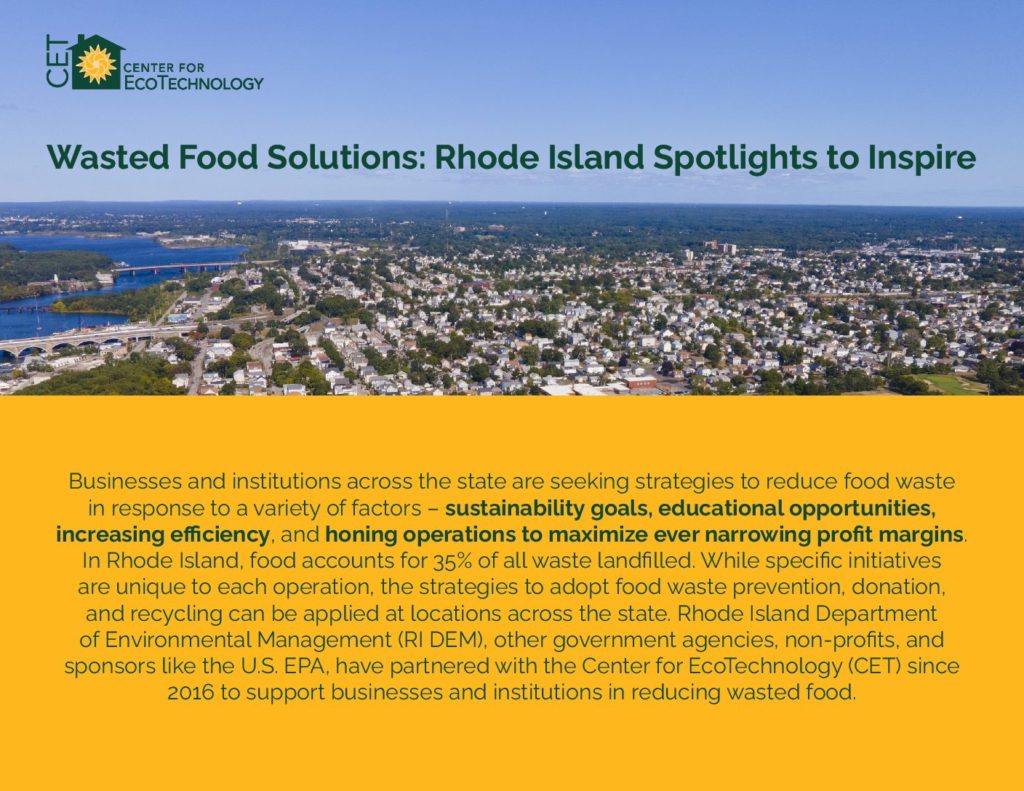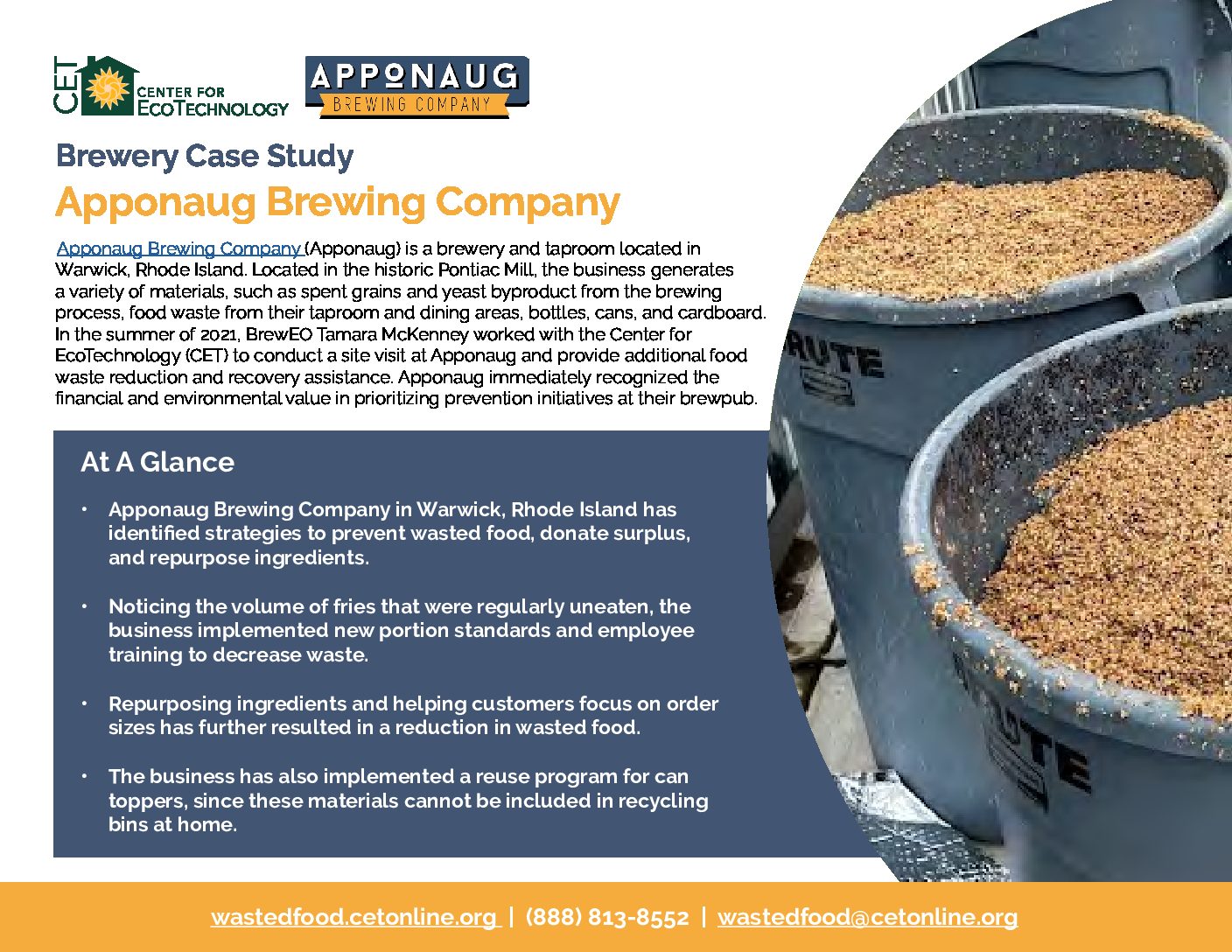
CET ha ayudado a muchas empresas e instituciones de Rhode Island a aprender más sobre la recuperación de alimentos y las oportunidades de desvío de alimentos desperdiciados. Cuando se trata de prevenir y desviar una amplia gama de materiales de la eliminación, ¡podemos ofrecer apoyo sin coste alguno! Ayudamos a una amplia gama de empresas, desde las que acaban de empezar hasta las que quieren llevar sus esfuerzos existentes al siguiente nivel.
Teléfono: 888-813-8552 | Correo electrónico: wastedfood@cetonline.org
El Centro de Ecotecnología (CET) ayuda a las empresas e instituciones de Rhode Island a desviar los alimentos desperdiciados y apoya el crecimiento del mercado de proveedores de servicios. El CET da a conocer la Ley de Reciclaje de Residuos Alimentarios de Rhode Island y colabora con proveedores de servicios como Phood para apoyar sus tecnologías de reducción en origen en comedores de todo el estado. Estos y otros esfuerzos se llevan a cabo en colaboración con el Departamento de Gestión Medioambiental de Rhode Island, el Departamento de Sanidad de Rhode Island, la Corporación de Recuperación de Recursos de Rhode Island y el Director de Estrategia Alimentaria para apoyar los objetivos del plan Relish Rhody de reducción del desperdicio de alimentos.
Recursos útiles sobre alimentos desperdiciados en Rhode Island
- Digestión anaerobia
-
Destinado al Club de Reciclaje de las Escuelas de Rhode Island, el CET creó una visión general del proceso de digestión anaerobia.
-
- Informe CET sobre el estado del mercado de la recuperación de alimentos en Rhode Island
- Informe elaborado por el CET en 2017 en el que se exponen los éxitos existentes, los retos que hay que superar y las oportunidades para lograr un impacto significativo en el estado.
-
- Focos de Providence
- Los alimentos representan el 35% de todos los residuos depositados en vertederos en Rhode Island. La prevención, la donación y el reciclaje son esenciales para mejorar la salud pública y alcanzar los objetivos de acción climática. Descubra cómo las empresas e instituciones de Rhode Island colaboran para reducir el desperdicio de alimentos y cómo unirse a esta iniciativa.
- Destacados de Rhode Island Kit de herramientas de medios sociales
Este kit de herramientas para redes sociales contiene entradas ya redactadas y hashtags sugeridos para que pueda compartir fácilmente estas historias de éxito en las plataformas de redes sociales de su organización.
- Focos de Providence
- Informe sobre la estrategia alimentaria: Relish Rhody
-
- Informe sobre el sistema alimentario de Rhode Island elaborado en 2017. El informe Relish Rhody incluye una sección sobre minimización y desvío de alimentos desperdiciados.
-
- Herramientas de reducción del desperdicio de alimentos para los colegios de Rhode Island
- Como parte de la asociación Get Food Smart, Rhode Island, Rhode Island DEM y Rhode Island Schools Recycling Club han desarrollado este kit de herramientas con recursos y consejos para que las escuelas de Rhode Island reduzcan su desperdicio de alimentos. Incluye estudios de casos y orientación para medir, prevenir y redistribuir los excedentes de alimentos, así como formas de involucrar a la comunidad escolar en la creación de sus soluciones.
- Plan integral de residuos sólidos 2038 para Rhode Island
- El plan de gestión de residuos sólidos elaborado por la División de Planificación de Rhode Island describe las prácticas, programas y actividades existentes en las principales áreas de gestión de residuos sólidos, así como recomendaciones específicas para cada una de ellas. Uno de los elementos del Plan es el apoyo a la desviación de residuos alimentarios en el sector comercial mediante políticas, reglamentos y estatutos que fomenten el desarrollo de instalaciones privadas de procesamiento.
- Programas de certificación ecológica del Departamento de Gestión Medioambiental de Rhode Island
- Programas voluntarios desarrollados para ayudar a las empresas de diversas categorías a ser sostenibles y mejorar continuamente sus resultados en materia de prevención de la contaminación.
- Lista de recursos para la desviación de residuos alimentarios
- Lista de documentos de orientación y organizaciones de rescate de alimentos, recopilada por la Universidad de Rhode Island para la Conferencia del Grupo Operativo de Seguridad Alimentaria de Rhode Island de 2016.
- Orientación sobre el compostaje in situ de restos de comida
- Información y hoja de consejos imprimible "Hágalo usted mismo" de la Corporación de Recuperación de Recursos de Rhode Island (RIRRC) sobre el compostaje de residuos de alimentos in situ en escuelas, empresas y hogares. RIRRC también proporciona asistencia técnica gratuita a las empresas e instituciones de Rhode Island con programas de reciclaje y compostaje.
- Norma de seguridad alimentaria para el Banco Comunitario de Alimentos de Rhode Island
- Orientación sobre almacenamiento seguro de alimentos, manipulación de alimentos, solicitud de donaciones, recepción de donaciones, gestión de retiradas de alimentos y mantenimiento de registros para las agencias miembros del Rhode Island Community Food Bank.
- Rhode para acabar con el hambre: Done los excedentes de alimentos de su empresa
- Rhode to End Hunger, una iniciativa del Departamento de Salud de Rhode Island (RI DOH), se asoció con MEANS Database, para ayudar a hacer llegar alimentos comestibles no utilizados a organizaciones que puedan utilizarlos. La Universidad Johnson & Wales, Relish Rhody, el RI DOH, la EPA y la Asociación de Hostelería de Rhode Island colaboraron para crear una hoja de consejos para donar alimentos en Rhode Island.
- Compartir mesa y orientación para la donación de alimentos en las escuelas de Rhode Island
- foodSCAPE creó un documento de orientación para las escuelas de Rhode Island sobre la donación de excedentes de alimentos, incluida la donación externa a organizaciones sin ánimo de lucro y la donación interna a través de mesas de reparto. Este documento se elaboró con el apoyo del Departamento de Educación de RI, el Departamento de Salud de RI y el USDA.
- Recurso de Hope's Harvest para espigar
- Recurso para que agricultores, voluntarios y organismos de lucha contra el hambre de Rhode Island participen en la recuperación de alimentos en granjas, o espigamiento.
Leer
Lea historias de éxito de empresas e instituciones de todo el estado que buscan estrategias para reducir el desperdicio de alimentos en respuesta a diversos factores: objetivos de sostenibilidad, oportunidades educativas, aumento de la eficiencia y perfeccionamiento de las operaciones para maximizar unos márgenes de beneficio cada vez más estrechos.
Esperamos que estas historias le inspiren tanto como a nosotros y que las comparta en sus redes sociales.
BrewEO Tamara McKenney trabajó con CET para realizar una visita a las instalaciones de Apponaug y proporcionar asistencia en materia de reducción y recuperación de residuos alimentarios. Apponaug reconoció inmediatamente el valor financiero y medioambiental de dar prioridad a las iniciativas de prevención en su cervecería.
Ver
CET se asoció con la Universidad de Rhode Island para crear y emitir un seminario web centrado en los argumentos comerciales para reducir, rescatar y reciclar los alimentos desperdiciados. ¡Eche un vistazo!
Requisitos legales y reglamentarios de Rhode Island
- Rhode Island Prohibición del desperdicio de alimentos (Sección 23-18.9-17) incluida dentro de la Ley de Eliminación de Residuos, establece que a partir de enero de 2016, las empresas que produzcan más de 2 toneladas de residuos orgánicos a la semana están obligadas a desviarlos del vertedero si se encuentran a menos de 15 millas de una instalación autorizada de compostaje o digestión anaerobia. (Esto incluye mayoristas o distribuidores comerciales, fabricantes o procesadores industriales de alimentos, supermercados, complejos turísticos o centros de conferencias, salas de banquetes, restaurantes, instituciones educativas o religiosas, instituciones de investigación, instalaciones militares, corporaciones penitenciarias, hospitales u otras instituciones de atención médica y casinos). Las empresas e instituciones también tienen la opción de procesar los residuos orgánicos in situ o desviarlos para uso agrícola.
- A partir del 1 de enero de 2018, las instituciones educativas cubiertas que generen 1 tonelada de residuos orgánicos por semana o más deben reciclarlos en una instalación de compostaje o digestión anaeróbica, o mediante otro método de reciclaje autorizado.
- Los generadores de residuos alimentarios están exentos de reciclar materiales si no están situados a menos de 15 millas de una instalación de compostaje o digestión anaerobia. Además, los generadores están exentos si una instalación de compostaje o digestión anaeróbica situada en un radio de 15 millas carece de capacidad para aceptar sus materiales.
- La ley de residuos alimentarios en las escuelas de Rhode Island exige, a partir del 1 de enero de 2022, que todas las escuelas cumplan con la prohibición estatal de residuos alimentarios para desviar los residuos de los vertederos y promover la donación de alimentos no perecederos. Las escuelas tendrán que realizar una auditoría de residuos cada tres años con la Corporación de Recuperación de Recursos de Rhode Island (RIRRC), que proporcionará directrices y estrategias individualizadas para reducir los residuos en cada escuela. También exige que todas las escuelas de Rhode Island implanten y utilicen mesas compartidas y anima a seleccionar empresas de servicios alimentarios que reciclen los residuos orgánicos y compren al menos el 10% de los productos localmente.
- Hojas informativas útiles sobre leyes de donación de alimentos de la Clínica de Derecho y Política Alimentarios de Harvard
- Ley Emerson de Donación de Alimentos al Buen Samaritano
- La Ley Federal Bill Emerson de Donación de Alimentos por el Buen Samaritano (Ley Pública 104-210) protege a los donantes de la responsabilidad civil y penal en caso de que el producto, donado de buena fe, cause posteriormente daños al receptor necesitado.
En la prensa:
-
Un ciclo centrado en los restaurantes habla de cómo reducir el desperdicio de alimentos en beneficio del medio ambiente - Rhode Island Mensual
-
El programa de recuperación de alimentos de la URI reduce el desperdicio de comida y mejora el acceso de los habitantes de Rhode Island a los alimentos - Noticias de la Universidad de Rhode Island
-
La URI pone en marcha una iniciativa de educación comunitaria para abordar los problemas de acceso y desperdicio de alimentos - Noticias de la Universidad de Rhode Island

